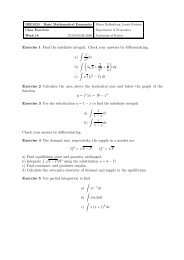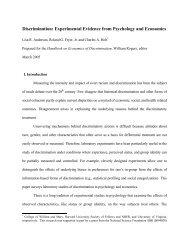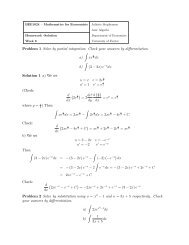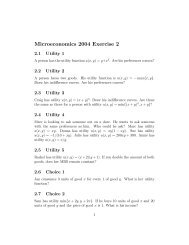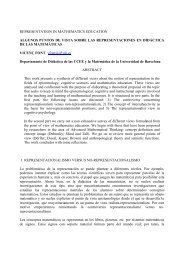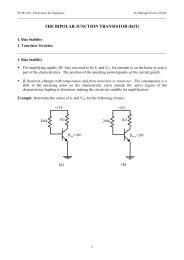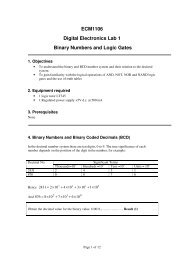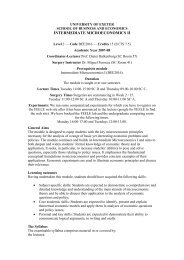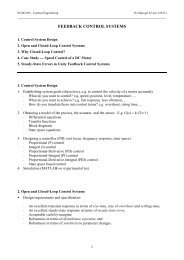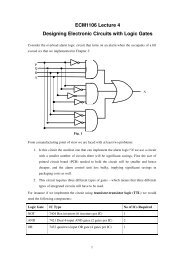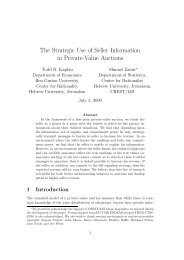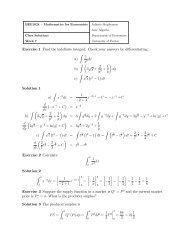of cost are −0.271 (p < 0.01) in the control sessions, <strong>and</strong> −0.317 (p < 0.01) in the treatmentsessions.By Result 4, we reject hypotheses 4 <strong>and</strong> 5. Like the effects of group identity on distributionpreferences, the effects of group identity on reciprocity preferences are also asymmetric, as participantsare more likely to reward an ingroup member’s good behavior but less likely to punishan ingroup member’s misbehavior. Both of these findings are again consistent with putting moreweight on an ingroup match’s payoff, or being more altruistic towards an ingroup match.The analyses also provide insights into the connection between distribution <strong>and</strong> reciprocitypreferences. Specifically, an outcome with more equal payoffs will increase the probability of bothpositive <strong>and</strong> negative reciprocity. Interestingly, participants seem more concerned with payoff distributionsthan with intentionality. As shown in Table 4, when B’s choice to reciprocate encountersa conflict with her distribution concerns, she prefers the choice which reduces inequality to thechoice that entails reciprocation.Next, we investigate the effect of group identity on the tendency to choose SWM actions, athird important element in social preference. We compute the proportion of participants who makeSWM decisions for both the control <strong>and</strong> treatment sessions. In doing so, we exclude three games,Dict 5, Resp 5a <strong>and</strong> 5b, <strong>and</strong> role B in game Resp 9, as the outcomes in these games have the sameaggregate payoffs. The results are presented in Table 5. Game-by-game results are not presenteddue to space limitations, but are available from the authors upon request.[Table 5 about here.]Table 5 reports the proportion of SWM decisions for Players A <strong>and</strong> B, as well as for all players,for three conditions: ingroup matching (column 2), outgroup matching (column 3), <strong>and</strong> controlsessions (column 4). Column 5 presents the alternative hypothesis that participants are more likelyto choose SWM decisions when matched with an ingroup member than when matched with an outgroupmember, as well as the p-values for paired-sample t-tests for Players A <strong>and</strong> B, as well as forall players. Column 6 presents the p-values for t-tests of proportions for the alternative hypothesisthat participants in treatment sessions are more likely to choose SWM decisions when matchedwith an ingroup member than are participants in control sessions. The last column presents similartest results for the alternative hypothesis that outgroup matches are less likely to lead to SWMoutcomes than matches in control sessions.Result 5 (<strong>Social</strong> Welfare Maximization). Both Players A <strong>and</strong> B are significantly more likelyto choose SWM decisions when matched with an ingroup member than when matched with anoutgroup member. Compared with the control session, participants are more likely to choose SWMdecisions if matched with an ingroup member, but less likely to do so if matched with an outgroupmember.Support. Column 5 in Table 5 presents the p-values for paired-sample t-tests, p < 0.01, forPlayers A <strong>and</strong> B as well as for all participants, obtained by comparing the proportion of SWMdecisions for ingroup vs. outgroup matchings. Column 6 presents the p-values for t-tests of proportions,p < 0.05 for Player A <strong>and</strong> for all players, whereas p < 0.10 for Player B, comparing theingroup vs. control sessions. Column 7 presents the p-values for t-tests of proportions, p < 0.05for Players A, B <strong>and</strong> for all players, comparing outgroup vs. control sessions.16
By Result 5, we reject Hypothesis 6 in favor of the alternative hypothesis that group identity hasa significant effect on the likelihood of SWM choices. Comparing the treatment results with thosefrom the control sessions, we find that participants are significantly more likely to choose SWMactions for the ingroup matches, <strong>and</strong> are more likely to withdraw SWM actions for the outgroupmatch.Result 5 predicts that, in games with a unique Pareto efficient outcome, people with salientgroup identities are more likely to choose SWM actions when they are matched with an ingroupmember. This prediction is consistent with findings of previous experiments. For example, in aPrisoner’s Dilemma game, participants are more likely to choose cooperation when matched withan ingroup member (Goette et al. 2006). Similarly, in a voluntary contribution public goods game,participants are more likely to contribute when they are matched with ingroup members (Eckel <strong>and</strong>Grossman 2005).We now exp<strong>and</strong> on the previous analysis to investigate whether various degrees of participationin the online chat option affect the likelihood of SWM actions. We use chat participationintensity (i.e., the number of lines or words in chat) or the self-reported group attachment in thepost-experiment survey to represent the strength of group identity. A stronger group affiliation isexpected to increase a SWM choice for an ingroup match. The other covariates in the analysis arethe gain in self-benefit, the gain in social benefit, the payoff gap when one is behind one’s match, 22<strong>and</strong> two dummy variables indicating good or bad intentions, i.e., whether Player A’s entry helps orhurts B, respectively.[Table 6 about here.]Table 6 presents the results of the logit specifications. As we examine the effects of intentionality,we restrict ourselves to Player B’s behaviors. 23 The dependent variable is the likelihoodof B choosing a SWM outcome. Column (1) corresponds to the control sessions <strong>and</strong> column (2)presents results for the baseline model for the treatment. Columns (3)-(5) incorporate the interactionterms of ingroup matching <strong>and</strong> strength of group attachment.Results in all specifications confirm Result 5 that a participant is more likely to choose a SWMaction when matched with an ingroup member. On average, ingroup matching increases the chanceof an SWM outcome from 11 to 18%. The interaction term of ingroup match <strong>and</strong> the number oflines (or words) a participant contributed to the chat is positive <strong>and</strong> significant (p < 0.05). Thisresult supports our hypothesis that, within a group, an SWM action is more likely to be selectedby those who demonstrate a stronger sense of group involvement. 24 The results also show that,although some SWM choices are motivated by a gain in self-benefit or are made easy by obtaininga higher payoff than the match, the preference of envy persists <strong>and</strong> in all cases dominates thesocial-welfare concern. Specifically, the payoff gap of 100 tokens to a participant’s disadvantagereduces the chance of an SWM action being chosen by about 12% (p < 0.01). By contrast, in thismodel, we cannot reject the hypothesis that the effects of intentionality are equal to zero.Given the above results regarding the effect of group identity on social preferences, we expectthat group identity will also have an effect on the final payoff. Next, we report the actual averageearnings by role <strong>and</strong> experiment conditions. To extract the maximum information out of the data,22 We do not include the payoff gap when one is ahead of the match, as Player B, by choosing a SWM action, gets apayoff that never exceeds Player A’s payoff.23 Games Dict 5, Resp 5a <strong>and</strong> 5b are excluded as all outcomes within each game yield the same aggregate payoff.24 We also investigate whether other ingroup members’ involvement in the chat option has any effect on one’s ownchoice. The estimated effect is basically zero.17
- Page 1 and 2: Group Identity and Social Preferenc
- Page 3 and 4: ehavior. Deviations from the prescr
- Page 5 and 6: identity strength on cooperative be
- Page 7 and 8: In our study, the stage of other-ot
- Page 9 and 10: while ρ(1 + a) measures the charit
- Page 11 and 12: Support. In Table 2, column 5 prese
- Page 13 and 14: when A is an outgroup match. When A
- Page 15: compared to outgroup matching, incr
- Page 19 and 20: induced identity, when matched with
- Page 21 and 22: APPENDIX A. Sequential Games with S
- Page 23 and 24: Based on your choices, you prefer t
- Page 25 and 26: [New Screen]Please record your deci
- Page 27 and 28: [New Screen, Game 1, Player A]In th
- Page 29 and 30: [New Screen, Game 3, Player B]In th
- Page 31 and 32: Appendix C. Post-Experiment Survey(
- Page 33 and 34: Session # Treatment or Control Game
- Page 35 and 36: Dependent Variables Prob(B rewards
- Page 37 and 38: Dependent Variable:Prob(B Choosing
- Page 39 and 40: Tokens3503002502001501005000 1 2 3
- Page 41 and 42: ReferencesAkerlof, George and Rache



